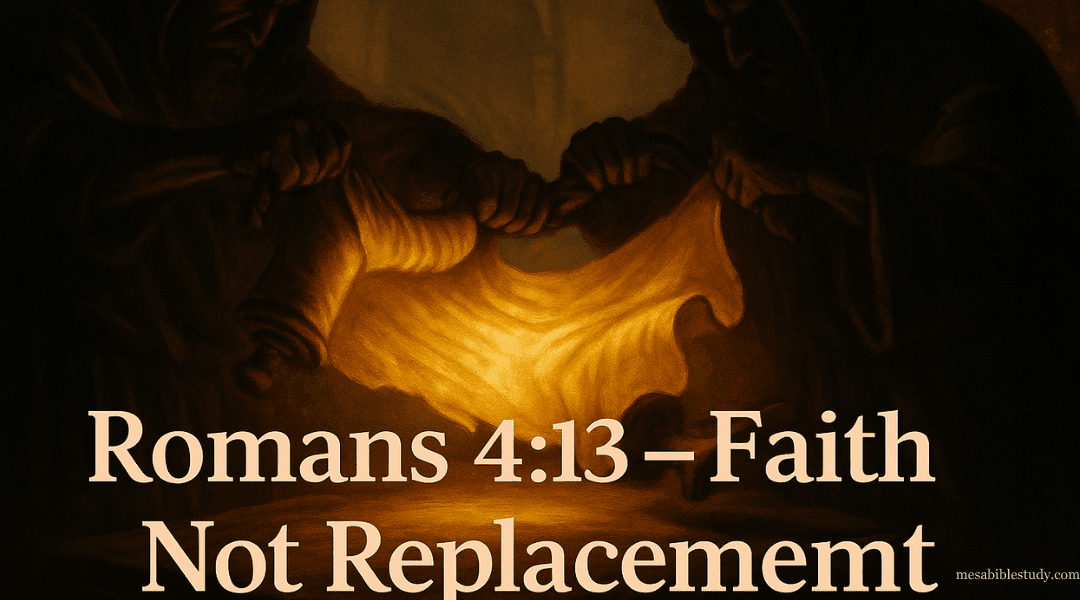
by Jamie Pantastico | Oct 31, 2025 | Bible Doctrine |
The cross wasn’t a reaction to sin (old Adam); it was God’s eternal plan to deal with it once and for all.
Romans 5:8–9
“But God demonstrates His own love toward us, in that while we were still sinners, Christ died for us. Much more then, having now been justified by His blood, we shall be saved from wrath through Him.”
The Love and Wisdom of God Revealed
This is mind-boggling the love and wisdom of God on full display in Romans 5:8–9!
The Godhead—Father, Son, and Holy Spirit—didn’t debate who deserved salvation. They didn’t run background checks or separate the “good” from the “bad.” The decision was made before time began: God the Son would step out of the invisible spiritual realm, take on flesh, go to the cross, and die—not for the righteous, the charitable, or the church-goers—but for all mankind. Because all have sinned and fall short of the glory of God. Beloved no goes to the lake of fire for sin, but for unbelief, then of course the wages old Adam paid out during that persons life time will come into play.
All have been reconciled and justified freely by His grace. The pardon has already been issued; it only needs to be received—by faith alone in the gospel.
Absolutely mind-boggling. Praise God for His unfathomable love! ❤️✝️
The Cross: A One-Time, Completed Event
When Paul writes, “Christ died,” the verb tense matters. It’s past tense—completed, never to be repeated. The cross was not an afterthought or a reaction to human sin; it was the eternal plan of God, foreordained before the foundation of the world (Acts 2:23; 1 Peter 1:19-20).
At Calvary, sin (old Adam) was judged once for all. The blood of Jesus fully satisfied God’s righteous demands. There will never again be another sacrifice for sin because the work of redemption is finished.
“For by one offering He has perfected forever those who are being sanctified.” — Hebrews 10:14
Christ’s death was sufficient not just for a few, but for all humanity—for every generation, for every sin, for every heart that would ever believe.
Reconciliation: The Result of the Cross
Paul echoes this truth in 2 Corinthians 5:21:
“For He made Him who knew no sin to be sin for us, that we might become the righteousness of God in Him.”
The innocent (sinless) became sin so that the guilty could be made righteous. That’s the great exchange of the gospel—the very heart of reconciliation.
Earlier in the same chapter, Paul wrote:
“God was in Christ reconciling the world to Himself, not imputing their trespasses to them…” (2 Corinthians 5:19)
Notice again the past-tense language: was reconciling. The work is done. The world has been reconciled, the debt paid, the pardon signed. But though reconciliation has been accomplished, it must be personally received through faith in the gospel.
Faith Alone Makes It Personal
Every person has already been offered peace with God, but only those who believe Paul’s gospel—that Christ died for our sins, was buried, and rose again the third day (1 Corinthians 15:1-4)—receive that reconciliation personally.
Salvation is not about striving or performing; it’s about believing what God has already done. The moment faith meets the finished work of Christ, the believer is justified, sealed, and declared righteous forever.
The Cross Displays the Heart of God
Romans 5:8-9 isn’t merely about the mechanics of salvation—it’s a window into the heart of God. It shows the measure of His love, His wisdom, and His grace toward a fallen world.
The Creator Himself stepped out of the invisible spirit realm into His creation to die for His enemies, knowing most would reject Him. That’s divine love beyond comprehension—unconditional, unearned, and unending.
Conclusion
The cross stands as the greatest demonstration of God’s love and wisdom. It was not a reaction to sin but the fulfillment of an eternal plan conceived before time began. The debt of sin is paid, the world reconciled, and the pardon signed—awaiting only faith to make it personal.
“While we were still sinners, Christ died for us.” — Romans 5:8
Absolutely mind-boggling. Praise God for His unfathomable love! ❤️✝️
📖 Scripture References
Romans 5:8-9; 1 Corinthians 15:1-4; 2 Corinthians 5:19, 21; Hebrews 10:14; 1 Peter 1:19-20

by Jamie Pantastico | Oct 30, 2025 | Bible Doctrine |
“He answered and said to them, ‘When it is evening you say, “It will be fair weather, for the sky is red”; and in the morning, “It will be foul weather today, for the sky is red and threatening.” Hypocrites! You know how to discern the face of the sky, but you cannot discern the signs of the times.’” — Matthew 16:2–3
A Moment of Mixed Emotions
Praise God—twenty Israeli hostages have been returned alive. We give thanks for every life spared and pray for their healing. Yet alongside this moment of relief comes deep sorrow: Israel also received the body parts of hostages who died under brutal Palestinian captivity. It is a grim reminder of the evil that has once again shown its face against God’s covenant people.
The Deal That Defies Reason
What do the Palestinians receive in return? A so-called new country—a Palestinian state—armed, financed, and protected by Israel’s enemies. Under the guise of a “peacekeeping coalition,” nations like Turkey and a coalition of Arab armies will occupy Gaza, “to maintain peace,” while being armed to the teeth.
To make matters worse, the arrangement places President Trump as head of a new “Board of Peace,” and proposes making half of Jerusalem the capital of this fantasy nation of Palestine. This isn’t peace. It’s deception—crafted in the flesh and fueled by spiritual blindness.
The Illusion of Peace
Daniel 8:25
And through his policy also he shall cause deceit to prosper in his hand; and he shall magnify himself in his heart, and by using peace shall destroy many. He shall also stand up against the Prince of princes, but he shall be broken without raising a hand.
The world applauds this as “historic.” But God’s Word tells us exactly what this is: “For when they say, ‘Peace and safety!’ then sudden destruction comes upon them.” (1 Thessalonians 5:3)
Man’s peace is a mirage. It promises security but breeds destruction. There can be no lasting peace until the Prince of Peace Himself returns. Until then, every diplomatic “solution” that divides Israel’s land and undermines God’s covenant will fail.
Qatar, Turkey, and the Coalition of Evil
While this so-called peace plan unfolds, Qatar—long accused of financing terrorism, sheltering Hamas leaders, and funding the Muslim Brotherhood—has been elevated to ally status. A Qatari military facility is being built on U.S. soil at Mountain Home Air Force Base in Idaho. This is the same Qatar that bankrolls indoctrination programs in American universities and underwrites radical Islamist causes worldwide.
Turkey, openly hostile to Israel, is also being positioned as a “peace enforcer.” The deception is complete when the world calls evil good and good evil (Isaiah 5:20).
Discernment wins the day. The trajectory isn’t peace—it’s war. Every prophetic sign points in that direction.
The Real Target: Jerusalem
This is what it’s always been about. The nations can talk of “peace,” “security,” and “justice,” but their true goal is Jerusalem—the heart of Israel, the city of where the Lord Jesus will sit on David’s throne.
“Behold, I will make Jerusalem a cup of drunkenness to all the surrounding peoples… a very heavy stone for all peoples; all who would heave it away will surely be cut in pieces.” (Zechariah 12:2–3)
From Genesis to Revelation, the conflict over this tiny piece of land has always been spiritual. Satan knows that the return of Christ is tied to Israel’s restoration and Jerusalem’s deliverance (Zechariah 14:4). Every coalition, every negotiation that weakens Israel’s sovereignty is a strike against God’s plan—but it will fail.
America’s Sinister Manipulation
Joel 3:2
‘I will also gather all nations, And bring them down to the Valley of Jehoshaphat; And I will enter into judgment with them there On account of My people, My heritage Israel, Whom they have scattered among the nations; They have also divided up My land.’
America speaks out of both sides of her mouth. One side proclaims “unbreakable support for Israel,” while the other issues threats: “You better not annex Judea and Samaria.” This is manipulation, not friendship. It’s the same pattern we’ve seen for decades—empty assurances wrapped in political pressure.
Judea and Samaria are not America’s to divide or negotiate. They are the heartland of the Jewish people, the land God promised to Abraham, Isaac, and Jacob forever (Genesis 17:7–8). The nations that touch this land will answer to God (Joel 3:2).
The Call for Discernment
Jesus warned the religious leaders of His day for failing to discern the signs of the times. That same blindness grips the world now. Politicians and preachers alike have lost their spiritual bearings, embracing alliances and ideologies that defy Scripture.
True believers must not be swept away by headlines or party loyalty. Our allegiance is to the truth of God’s Word, not to personalities or political coalitions. The coalition of evil forming before our eyes will not bless Israel—it will betray her.
The Hope We Hold
Though deception fills the earth, God’s promises stand. Israel will not be destroyed. The same Lord who scattered her will gather her again in faith and glory. The nations will rage, but God’s plan will prevail (Psalm 2:1–4).
Christ is coming. He alone will bring peace to Jerusalem. Until then, we watch, pray, and discern.
A Prayer for Wisdom and Steadfastness
Heavenly Father we come to you with thankfulness and in Jesus name— grant us discernment in these perilous times. Keep our hearts and minds anchored in Your Word, not in the false peace offered by men. You have commanded us to pray for those in authority, and so we lift up President Donald J. Trump—asking that You grant him humility, wisdom, and courage to seek Your will above all else. Strengthen us, Lord, to be steadfast and bold—true ambassadors for Christ—unashamed of the gospel of the grace of God, and faithful until You call us home. In Jesus’ name, Amen.

by Jamie Pantastico | Oct 27, 2025 | Devotionals |
Devotional: He Gives Power to the Weak
📖 Part 4 of 5 — The Overcomer Series
A five-day devotional journey showing how God transforms fear into faith, weakness into strength, and affliction into refinement through Christ.
Isaiah 40:29 – “He gives power to the weak, and to those who have no might He increases strength.”
Context & Connection
Isaiah wrote these words to weary exiles who felt abandoned and powerless. Their strength was gone, their hope dim. Yet God, through the prophet, reminds them that He never grows weary—and He delights in renewing those who depend on Him.
The Apostle Paul captures this same truth in 2 Corinthians 12:9: “My grace is sufficient for you, for My strength is made perfect in weakness.” God’s power doesn’t wait for human strength—it fills the empty spaces where strength has run out.
Devotional Insight
The world celebrates self-confidence and independence, but God works through surrender and weakness. His strength begins where ours ends. Isaiah reminds us that divine power flows not to the proud, but to the humble and dependent.
Paul learned this deeply through his “thorn in the flesh.” Rather than removing his struggle, God used it to reveal a greater truth—that His grace is sufficient. When we stop striving to be strong and instead rest in His grace, His power becomes visible in our lives.
Feeling weak doesn’t disqualify you; it positions you to experience God’s strength. The Lord delights in lifting the weary, renewing the exhausted, and empowering the humble.
Encouragement for Today
If you feel drained, remember this promise: your weakness is not failure—it’s opportunity. God’s power is most clearly seen when we come to the end of ourselves.
Rest in His sufficiency. Let His strength carry you through what your own cannot. When you feel too weak to move forward, lean into His grace—and watch His power lift you up.
📖 Reading Plan:
- Isaiah 40:28–31 – Those who wait on the Lord shall renew their strength.
- 2 Corinthians 12:7–10 – God’s strength is made perfect in weakness.
- Philippians 4:13 – I can do all things through Christ who strengthens me.

by Jamie Pantastico | Oct 26, 2025 | Pauline Theology |
Peter saw it coming—men twisting Paul’s words to Erase Israel
Key Passage:
“…our beloved brother Paul, according to the wisdom given to him, has written to you, as also in all his epistles, speaking in them of these things, in which are some things hard to understand, which those who are untaught and unstable twist to their own destruction, as they do also the rest of the Scriptures.”
— 2 Peter 3:15–16
Opening Context
Peter’s final warning before his death was prophetic — and it’s being fulfilled before our eyes. False teachers in today’s apostate church twist Paul’s letters to erase Israel from God’s plan and to pervert the gospel of grace. From Romans 4:13 to Galatians 3:29, they contort Paul’s writings into a theology that paints God as unfaithful and His covenants as broken.
1️⃣ Peter’s Warning in Real Time
When Peter wrote these words, the gospel of grace revealed to Paul was still new and radical — salvation apart from the Law, by faith alone in the finished work of Christ. Peter admitted Paul’s letters were “hard to understand,” not because they were unclear, but because they introduced revelation previously hidden (Ephesians 3:3–6).
Today, “untaught and unstable” teachers repeat the same error — twisting Paul’s message into what it never meant.
2️⃣ How Replacement Theology Fulfills Peter’s Warning
Those who preach that “the Church has replaced Israel” do exactly what Peter condemned. They wrench Paul’s words out of context, turning his defense of faith into a doctrine of displacement. Romans 4:13, Galatians 3:29, and Ephesians 3:6 are not statements of replacement — they’re declarations that Gentiles are partakers, not takers.
To distort Paul’s gospel is to slander the very faithfulness of God.
3️⃣ Why This Matters
If God could break His promises to Israel, how can we trust His promises to the Body of Christ? The same God who keeps His word to Abraham, Isaac, and Jacob keeps His word to you. His covenants are irrevocable (Romans 11:29).
4️⃣ The Full Counsel of God
When Scripture is rightly divided, there is no conflict between Paul and Peter, Israel and the body of Christ. Paul explains the how of salvation; Peter reminds us who God is — faithful, just, and unchanging. The twist lies not in the text but in the teachers.
Closing Charge
We are witnessing prophecy fulfilled in real time. Peter warned of it. Paul endured it. We must confront it.
Let’s stand firm on the unbreakable promises of God and expose every doctrine that dares to call Him a liar.
“Let God be true but every man a liar.” — Romans 3:4

by Jamie Pantastico | Oct 25, 2025 | Verse-by-Verse Bible Studies |
Passage Breakdown: Romans 4:13 — Twisted to Erase Israel
“For the promise that he would be the heir of the world was not to Abraham or to his seed through the law, but through the righteousness of faith.” — Romans 4:13
📖 Context & Setting
Paul is writing about justification by faith, not about replacement by the Church. The apostle is contrasting two covenants — Law versus Grace — not two peoples — Israel versus the Church.
This entire section (Romans 4:1–25) builds on Abraham’s faith before the Law to prove that righteousness has always been by faith, not by works. It says nothing about God canceling His promises to Israel or handing them to Gentiles.
⚠️ Peter’s Warning Fulfilled
The apostle Peter foresaw what we’re witnessing today. In 2 Peter 3:15–16, he wrote:
“…our beloved brother Paul, according to the wisdom given to him, has written to you, as also in all his epistles, speaking in them of these things, in which are some things hard to understand, which those who are untaught and unstable twist to their own destruction, as they do also the rest of the Scriptures.”
Adherents of replacement theology are living proof of Peter’s warning. They twist Paul’s writings—like Romans 4:13—to make them say what Paul never said. They rip verses from context to teach that God has broken His promises to Israel and transferred them to the Church. But Peter warned that such distortion is not only error—it leads to destruction.
When Scripture is rightly divided, the truth becomes clear: God’s covenants are unbroken, His Word is sure, and His promises to Israel stand forever.
“For the gifts and the calling of God are irrevocable.” —Romans 11:29
🔍 Phrase-by-Phrase Breakdown
“For the promise…”
What promise? The same one first given in Genesis 12:3 — that in Abraham all nations of the earth shall be blessed. For us today it’s salvation!
“That he would be the heir of the world…”
This doesn’t mean Abraham would rule a global kingdom in his lifetime or that Gentiles replace Israel to rule a kingdom. It means that through Abraham’s Seed (Christ — Galatians 3:16), salvation would extend to all mankind. The inheritance is spiritual — righteousness (salvation) by faith alone — not national territory.
“Was not … through the law, but through the righteousness of faith.”
Paul’s point is simple: the Law never produced heirs; faith did. Abraham was justified before circumcision, before Sinai, before Israel was even a nation. Faith has always been the means of blessing — but that doesn’t nullify Israel’s future role in God’s plan (Romans 11:1-2, 29).
🚫 What This Verse Does NOT Say
❌ It does not say that the Church replaces Israel.
❌ It does not say that God revoked His covenant with Abraham’s physical descendants.
❌ It does not say that Israel’s national promises are now “spiritualized” and given to the Gentiles.
✅ It does affirm that righteousness and salvation have always been received by faith — for Jew and Gentile alike — through the same gospel of grace.
🧱 Scripture with Scripture
- Genesis 12:3 — “In you all the families of the earth shall be blessed.”
→ God’s covenant with Abraham had global impact but remained rooted in Israel.
- Galatians 3:16 — “The promises were made to Abraham and to his Seed … which is Christ.”
→ Gentiles are blessed in Christ, not by replacing Israel.
- Romans 11:1-2, 29 — “Has God cast away His people? Certainly not! … For the gifts and the calling of God are irrevocable.”
→ That promise still stands.
- Amos 9:15 — “I will plant them in their land, and no longer shall they be pulled up.”
→ That is literal, national, irrevocable restoration — not allegory.
⚡ Refuting the Replacement Lie
Those who weaponize Romans 4:13 are guilty of lifting a verse out of a chapter about faith and turning it into a doctrine about national identity.
Paul never redefines who Israel is. He redefines how righteousness comes.
To make Romans 4:13 say that the Church inherits Israel’s covenants is theological fraud — it turns God’s faithfulness into betrayal.
If God could revoke His promises to Israel, how could anyone trust His promises to the Church?
✅ In Summary
Romans 4:13 teaches that:
- Abraham received righteousness by faith, not by law.
- The blessing through his Seed (Christ) extends salvation to all nations.
- God’s covenant promises to Israel remain literal and future.
- The Church partakes in the spiritual blessing of salvation — it does not replace Israel’s inheritance.
⚠️ Final Word
Romans 4:13 isn’t about cancellation — it’s about confirmation.
It doesn’t replace Israel — it reaffirms the very faith that made Israel’s patriarch righteous in the first place.
God has never broken His word — and He never will.
“Let God be true but every man a liar.” — Romans 3:4




